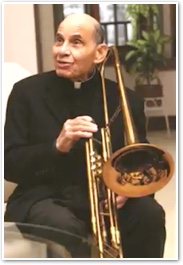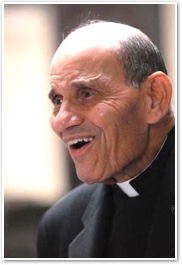Msgr. John Sanders, the priest who played with Duke Ellington
- THOMAS V. MIRUS
Earlier this week, I made a visit to Our Lady Queen of the Clergy Retirement Home in Stamford, CT to interview Msgr. John Sanders, who played with Duke Ellington for five years and then became a Catholic priest.
 Msgr. Sanders's memory was not up to a full podcast interview on the day I visited, but I had a wonderful visit nonetheless. He is a very sweet and humble man who clearly wanted to do his best to give me what I needed.
Msgr. Sanders's memory was not up to a full podcast interview on the day I visited, but I had a wonderful visit nonetheless. He is a very sweet and humble man who clearly wanted to do his best to give me what I needed.
The memories that remained were seemingly the most important things. Above all, Msgr. Sanders kept repeating how wonderful it was that as a boy, his Aunt Edith took him to the Apollo Theater over and over again to hear the likes of Ellington, Count Basie, and Louis Armstrong. He never could have imagined he would be playing in Ellington's band some day.
Yet by God's providence, after a stint with the great saxophonist Lucky Thompson, Sanders ended up replacing long-time Ellington band member Juan Tizol (two of whose tunes, "Caravan" and "Perdido," are jazz standards) in both his roles — as trombonist and score copyist. The latter job was one most band members considered tedious, but Sanders considered it a great honor.
Sanders played with Ellington from 1954-1959, during which time the band recorded such albums as Such Sweet Thunder; Black, Brown and Beige featuring the great gospel singer Mahalia Jackson; Ella Fitzgerald Sings the Duke Ellington Songbook; the first full recording by jazz musicians of Gershwin's Porgy and Bess; and Ellington's film score Anatomy of a Murder. He also took part in the famous concert at the 1956 Newport Jazz Festival, in which a 27-chorus blues solo by saxophonist Paul Gonsalves made the crowd go wild and effectively revived Ellington's career.
When Sanders decided to leave the band and enter seminary, Ellington was supportive, and even attended his former trombonist's first Mass. Msgr. Sanders spoke with as much gratitude and awe of having been able to spend his life as a priest as he did of the amazing experience of having played with one of jazz's greatest giants.
 Msgr. Sanders told me numerous times that his life had been more wonderful than he had ever imagined it would be. At the end of our conversation I asked if he had ever missed the musician's life after becoming a priest. He responded:
Msgr. Sanders told me numerous times that his life had been more wonderful than he had ever imagined it would be. At the end of our conversation I asked if he had ever missed the musician's life after becoming a priest. He responded:
No, I think whatever was called for to be or to do, I was always able to go in the right direction. And I thought I was very fortunate to be led one day to becoming a priest. I never thought it would happen to me, and I am thankful for it. Even now when I'm retired, I am thankful for the blessings that I have received; I can't thank God, our Lord enough. And I hope that every day that I live, I do and think in a way that is doing God's work. It's good. Just thankful.
For a more detailed version of Msgr. Sanders's story, see this L.A. Times article from 1990.
 This is Meaghen Gonzalez, Editor of CERC. I hope you appreciated this piece. We curate these articles especially for believers like you.
This is Meaghen Gonzalez, Editor of CERC. I hope you appreciated this piece. We curate these articles especially for believers like you.
Please show your appreciation by making a $3 donation. CERC is entirely reader supported.

Acknowledgement
Thomas V. Mirus. "Msgr. John Sanders, the priest who played with Duke Ellington." Catholic Culture (September 13, 2018).
Reprinted with permission from Catholic Culture.org.
The mission of CatholicCulture.org is to give faithful Catholics the information, encouragement, and perspective they need to become an active force for renewal in the Church and in society, working to shape an authentically Christian culture in a secular world.
The Author
 Thomas V. Mirus is a pianist, composer, and occasional amateur comedian living in New York City. He produces and hosts The Catholic Culture Podcast. Thomas is an inveterate and wide-ranging reader in philosophy, theology, economics, politics, Catholic affairs, the visual arts and music. He brings a substantial breadth of understanding to his work at CatholicCulture.org.
Thomas V. Mirus is a pianist, composer, and occasional amateur comedian living in New York City. He produces and hosts The Catholic Culture Podcast. Thomas is an inveterate and wide-ranging reader in philosophy, theology, economics, politics, Catholic affairs, the visual arts and music. He brings a substantial breadth of understanding to his work at CatholicCulture.org.




